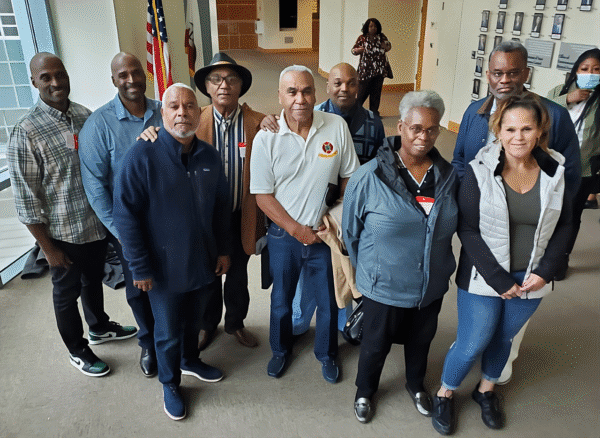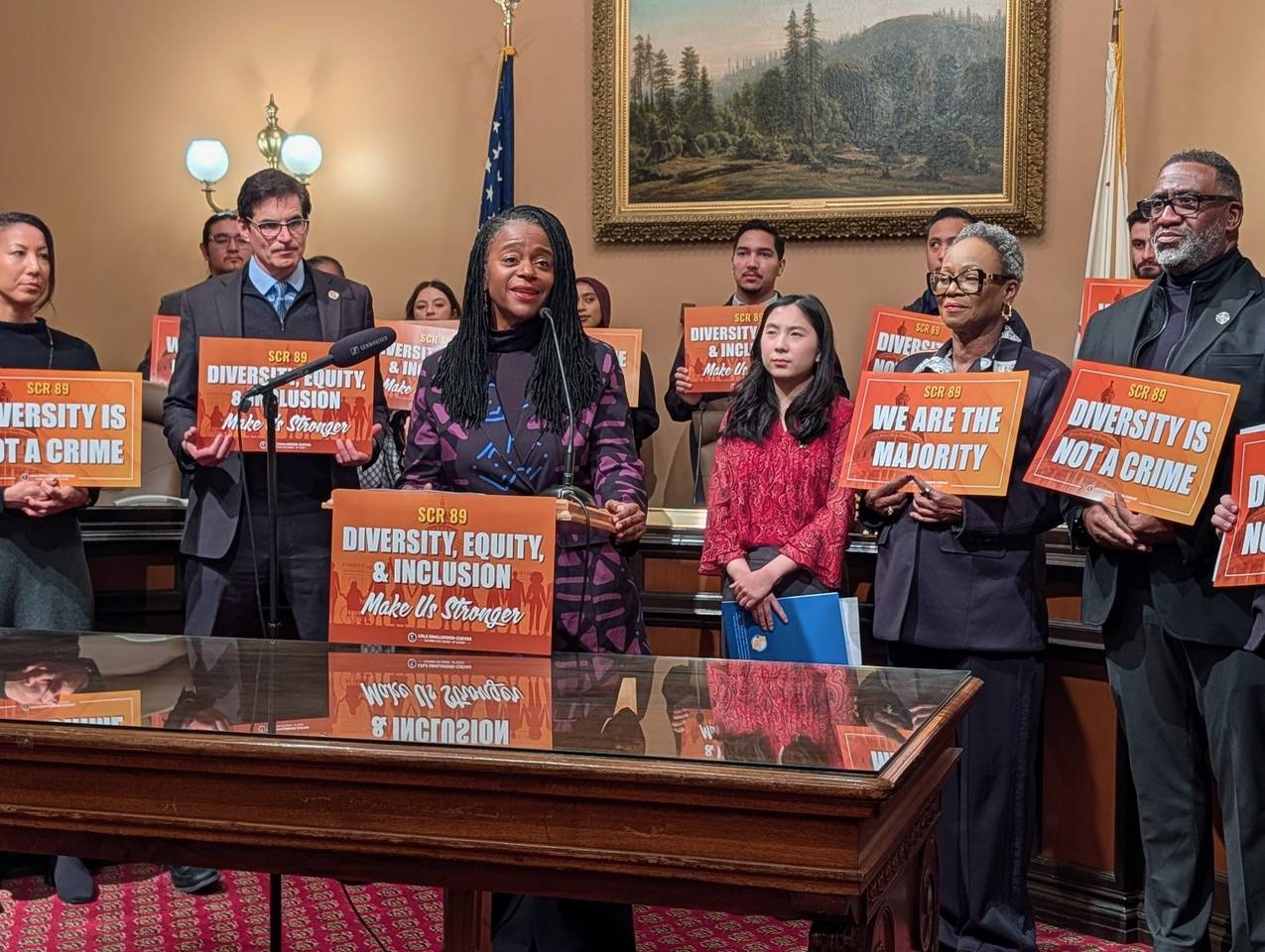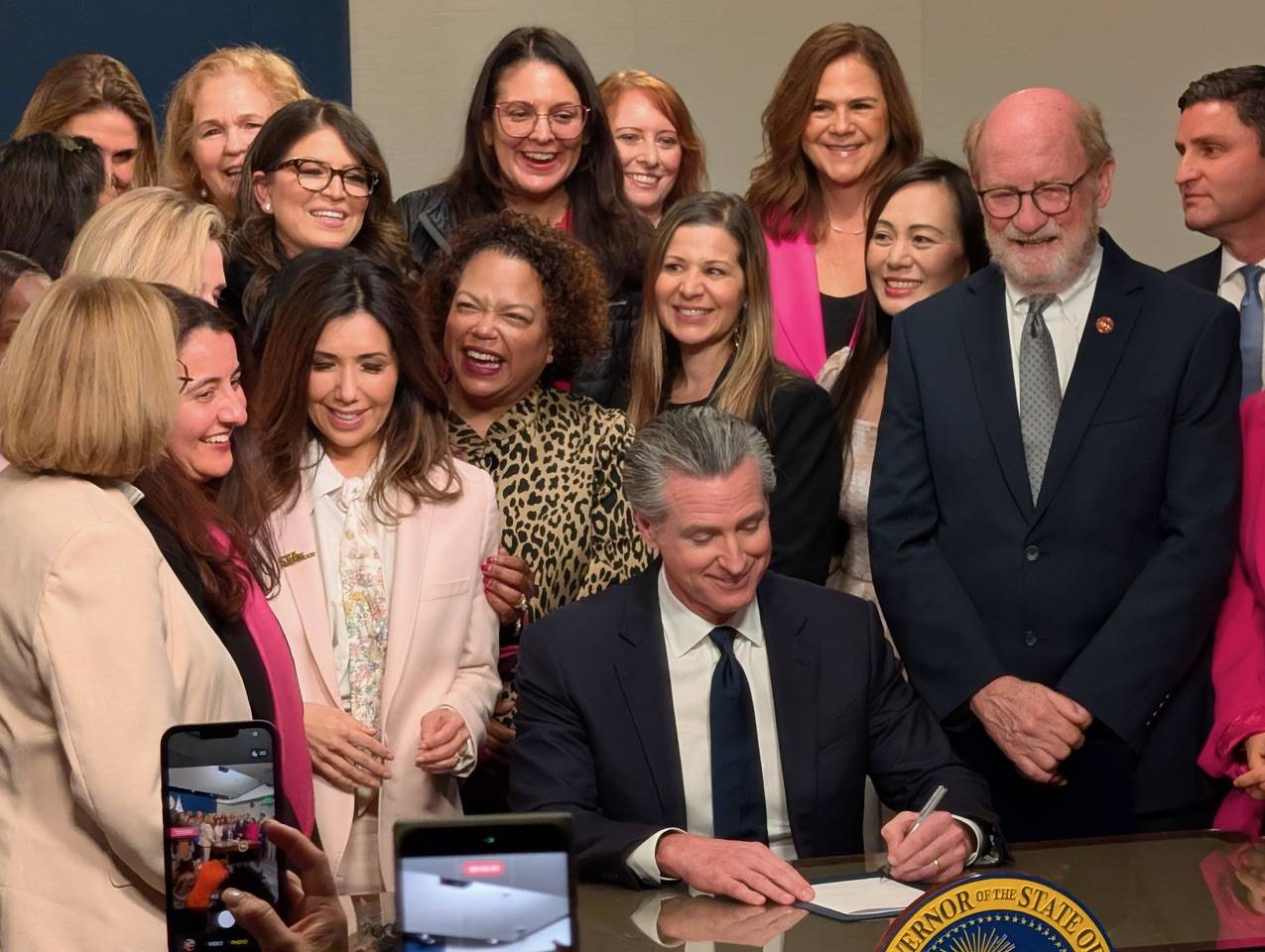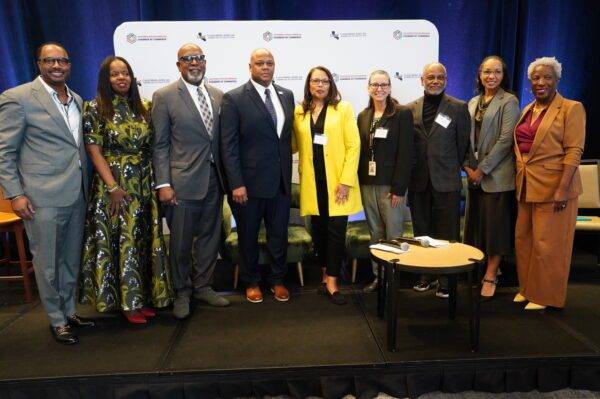Black families affected by government seizure of private property for public use attended a California Reparations Task Force meeting in Sacramento in March 2023. Pictured from left to right are Jonathan Burgess, Matthew Burgess, William Woolery, Elmer Fonza, Milford Fonza, Trent Mure, Marian Johnson, Michael Johnson, and Dawn Basciano. CBM photo by Antonio Ray Harvey.
Elmer Fonza and his family were disappointed to learn that Gov. Gavin Newsom vetoed a reparations-focused bill by Assemblymember Tina McKinnor (D-Inglewood) on Oct. 13. That legislation would have established a process for victims of racially motivated eminent domain to seek restitution.
Assembly Bill (AB) 62, also known as “Civil Rights Department: Racially Motivated Eminent Domain,” was one of several bills in the California Legislative Black Caucus (CLBC) “Road to Repair” legislative package officially rejected by Newsom.
“What Newsom did was wrong in vetoing this bill,” Fonza said. “He did this the last time a bill like (AB 62) reached his desk. Now, you have the reparations agency or bureau, but he still won’t sign it. It’s like he’s kicking it down the road to the next governor to let him deal with it.”
AB 62 was one of the measures Fonza and other Black families believed could help them obtain compensation for property allegedly—and illegally—taken from their families in California. McKinnor said she was “hopeful” that Newsom would sign the legislation, but he did the opposite.
In his Oct. 13, 2025, veto message for AB 62, Newsom stated that the state Civil Rights Department (CRD) lacks the resources and expertise to implement the bill’s requirements. The measure passed the Assembly with a 66–4 vote and the Senate with a 30–7 vote before being sent to the governor’s desk in September.
“CRD lacks the crucial expertise and immense resources required to successfully implement this bill,” Newsom wrote. “CRD, a prosecutorial agency, would need to establish an entirely new adjudicatory structure, inclusive of administrative judges, in order to adjudicate property disputes between governmental entities and individuals.”
Fonza, who lives in Las Vegas, and his brother Medford Fonza, who resides in the Los Angeles area, attended meetings across the state held by the California Reparations Task Force, a nine-member panel established to study the history of slavery and its ongoing systemic effects on African Americans, both nationally and in California.
The Fonza brothers’ great-great-great-grandfather, Nelson Bell, was brought to California as an enslaved person around 1850 to mine for gold. After gaining his freedom, Bell purchased land in Coloma, about 48 miles east of Sacramento. The family lost the property after his death in the 1870s, the Fonza brothers told the task force during a September 2022 meeting in Los Angeles.
Had AB 62 been signed, it would have established a CRD-administered process allowing dispossessed property owners or their descendants to apply for restitution. It would also have authorized CRD to investigate claims of racially motivated eminent domain and determine their validity.
Fonza believes the property was illegally taken. He said he found new hope when Newsom signed Senate Bill (SB) 518 on Oct. 10. The bill, authored by CLBC Chair Sen. Akilah Weber Pierson (D-San Diego), establishes the Bureau for Descendants of American Slavery, a state agency dedicated to addressing the harms of slavery and systemic discrimination.
“We would’ve been one of the first families standing in line to file a claim to get the process going,” Fonza told California Black Media (CBM). “My family has been researching (Bell’s) background for decades and has accumulated a lot of documents, but maybe not the ones we need. The state, the county may have those records.”
Other families who lost property through eminent domain also shared their stories with the task force, which was chaired by Los Angeles-based attorney Kamilah V. Moore. Amos Brown, president of the San Francisco NAACP and longtime civil rights activist, served as vice chair.
Dawn Basciano, who possesses eminent domain records related to her great-grandfather, Pearly Monroe, testified before the task force on Sept. 21, 2021. Monroe’s grandparents, Peter and Nancy Gooch, were formerly enslaved people who became respected citizens and orchard farmers in Coloma.
In the 1930s and 1940s, Pearly Monroe rejected state offers to buy his land, which included the original site of California’s gold discovery. Ultimately, he and other families lost their property after the state used eminent domain.
Basciano has since advocated for reparations for her family and other Black pioneer families whose land was taken to create Marshall Gold Discovery State Historic Park. She said, “Newsom’s failure to sign AB 62 leaves me deeply disappointed.”
“Gov. Newsom had an opportunity to address historical injustices by signing AB 62 into law and advocating for the fair compensation or return of land taken from Black families,” Basciano told CBM. “Creating a state bureau to further study reparations amounts to symbolic inequity rather than true progress, a move that feels performative and insulting to those who want real change. The pursuit of justice for Black families in California remains unfulfilled.”
In Santa Monica, city officials used eminent domain in 1958 to seize property at 1811 Ocean Avenue that was intended to become the Ebony Beach Club, a social venue planned by Black entrepreneur Silas White. The city demolished the building to build a civic parking lot. Today, the site is occupied by the 4-star Viceroy Santa Monica Hotel.
Efforts by the White family to obtain compensation are ongoing through legal and community channels, including the organization Where Is My Land.
Despite the governor’s veto, Fonza remains hopeful. He said that with the recent passage of SB 518, authored by Sen. Akilah Weber Pierson (D-San Diego). The state has already laid the groundwork for addressing systemic inequities and moving toward economic and institutional parity.
“I really don’t know what will happen from here, but he (Newsom) cracked the door open,” Fonza said. “Now, we have something that we didn’t have before. Regardless of how I and other people feel about it, we should use the bureau to open the door a little bit wider.”
____________
By: Antonio Ray Harvey, California Black Media







